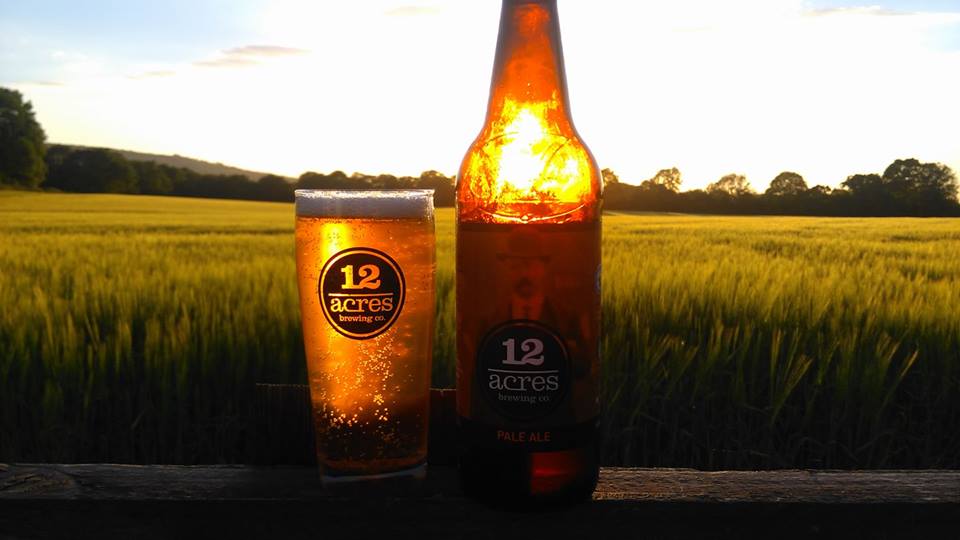A Laois farm enterprise is tapping into the growing market for craft beer. Paddy McDonald’s 12 acres brewing company is gaining ground – with recent listings at Dunnes’ Stores and Musgraves.
The 12 acres brewing company has worked with the Food Academy programme run by Musgraves and local enterprise offices, and is served in the restaurant at the five-star Ballyfin Demesne in Laois. Its draught market has also expanded, with approximately 50 taps pouring the beer at present.
 The McDonalds have farmed in Killeshin for generations. Paddy’s brother, Ian, is the sixth generation to farm at Clonmore. Their great grandfather, John, who features on the beer bottle, added to his holding there in the 1920s. The field, named the 12 acres, was one of the fields he bought. He grew malting barley for Minch in Athy.
The McDonalds have farmed in Killeshin for generations. Paddy’s brother, Ian, is the sixth generation to farm at Clonmore. Their great grandfather, John, who features on the beer bottle, added to his holding there in the 1920s. The field, named the 12 acres, was one of the fields he bought. He grew malting barley for Minch in Athy.
The farm had a history of agribusiness. “Our great grandfather set up the Leix Dairy on the farm in the 1920s. It was a successful local business, supplying milk and cream locally, up to the 1990s, when it was sold to Avonmore,” said McDonald.
His father, grandfather and uncle established Clonmore Meats on the farm in the 1970s. That business still operates, under the ownership of Tommy Brennan. McDonald came up with his own idea when travelling in Hanoi, Vietnam. Enjoying the fresh ‘beer of the day’, he thought he could make his own.
He approached Minch Malt with the idea of malting a batch of the family’s own barley, separately for them. The company came on board with the concept, and dried and malted 100t of Ian’s barley, separately through the maltings.
As a microbrewery brewing beer with malted barley grown on the family farm, the beers are enjoying great success. “You can look out from our farm brewery door and see the barley growing in the field that will become next year’s beer. That traceability factor matters to a lot of people,” McDonald said.
“Our water is pure untreated spring water from under the same land the barley is grown on, which adds another dimension to our beers’ traceability. We feed the spent grains to the sheep, ensuring a full life cycle for the grains on the farm,” he said.
They started off contract brewing with 9 White Deer in west Cork and then turned a sheep shed on the farm into a new microbrewery. McDonald completed a general certificate in brewing through the Institute of Brewing and Distilling in 2013.
A batch of 2,000L takes a day to brew; a week to ferment; and a further two to four weeks to condition, depending on the beer. It is then packaged in kegs or bottles, on the farm.
“We are getting great feedback on the product. We have built up a reputation for a quality premium product,” said McDonald.
“We do a lot of social media. Marketing is very difficult for a small company like ours, so social media and word of mouth are important. We have got a great response from local businesses, such as Ballyfin Demesne,” he said.
We are now brewing the crop of 2016 which was a really good year. The great thing about our operation is that we control all the inputs from ground to glass. That sets us apart.
Over the next year, the possibility of breaking into the export market will be explored. Recently the business took on a full-time sales person for Leinster, and it also has a quality service technician on the road.
“We have a wholesale partner in Tullys of Carlow, and we plan to work with Carlow IT, which has introduced a brewing course, over the next year,” said McDonald.
A recent Bord Bia report revealed that Irish craft beer is performing well across all fronts, from the number of production facilities to production output, market share and exports.
The number of craft breweries in Ireland has grown by more than 500% in the last five years, with 72 now in operation, up from just 15 in 2012, according to the research. Employment in these facilities exceeded 500 for the first time. Output also grew significantly significantly.
In 2012, the craft beer category recorded consumption market share of just 0.6%; in 2017 that figure reached 3.0%. In terms of production, craft beer rose from 0.4% in 2012 to 2.3% in 2016.
Denise Murphy, beverage sector manager at Bord Bia, said that while it’s acknowledged that the Irish craft beer category is still very young and these levels of growth are from a low base, the growth has been sustained over a number of years and looks set to maintain its upward trajectory. As the category expands, the importance of export business increases for the sector, she said.
“Demand for craft beer is rising in most markets around the world, driven by consumer preferences for premium product and artisan production.”
